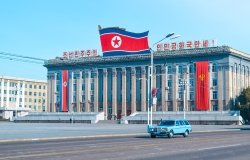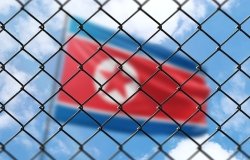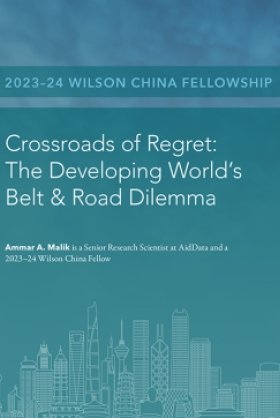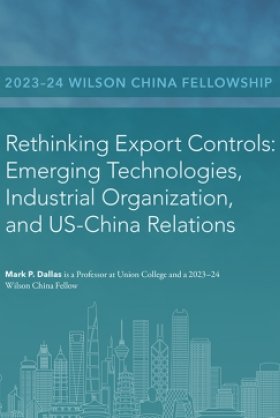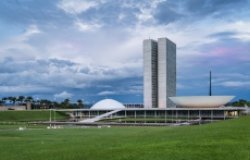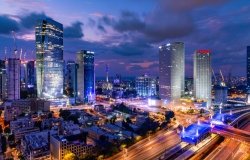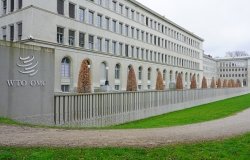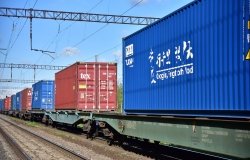Nigeria: Business, Investment, and Development Opportunities Presented by Six Key Nigerian Governors
The Africa Program in co-sponsorship with Africare and the Constituency for Africa presents the “Nigeria: Business, Investment, and Development Opportunities Presented by Six Key Nigerian Governors.”
Overview
H.E. Rotimi Chibuike Amaechi – Chairman of the Governors’ Forum, Governor of Rivers State
H.E. Ibrahim Shehu Shema – Governor of Katsina State
H.E. Liyel Imoke – Governor of Cross River State
H.E. Gabriel Suswam – Governor of Benue State
H.E. Owelle Rochas Anayo Okorocha – Governor of Imo State
H.E. Ibikunle Amosun – Governor of Ogun State
Ambassador Herman J. Cohen – President of Cohen and Woods International, retired from the U.S. Department of State in 1993
Wale Adeosun – Founder and Chief Investment Officer of Kuramo Capital Management, LLC
Ambassador Robin Renée Sanders – Career Member of the Senior Foreign Service, served in Nigeria beginning in December 2007
Steve McDonald – Program Director for the Africa and Leadership and State Capacity Building Programs of the Wilson Center
Although Nigeria is often thought of in terms of oil production and a legacy of military governance, recent democratic gains combined with anticorruption initiatives and a focus on development which are opening the country to investment in “non-oil” business and development ventures. In keeping with Africare's Policy Series and Constituency's For Africa's Ron H. Brown Series, the Wilson Center's Afrca Program hosted six Nigerian Governors who have been and continue to be instrumental in creating and advocating economic and human development in their respective states. 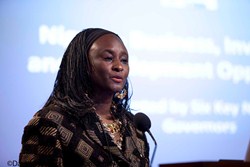 Ambassador Robin Sanders introduced each of the governors and said that she had “had the wonderful opportunity to visit all of their states many times and by far to [her] they are the dynamic, key governors that are doing incredible things in their states.” Ambassador Herman Cohen moderated the first panel discussion and quipped that the occasion was special, “because during my long career in diplomacy … and [having] interacted with many high government officials from the top and all of them were not elected people. They were all people mostly from the military and it is a privilege to be in the presence of people who were elected and are accountable to their constituents.” Each Governor proudly presented the opportunities in their state and encouraged private and public investors to forge lasting partnerships with the Nigerian people in order to ensure a strong, stable, and internationally significant Nigeria.
Ambassador Robin Sanders introduced each of the governors and said that she had “had the wonderful opportunity to visit all of their states many times and by far to [her] they are the dynamic, key governors that are doing incredible things in their states.” Ambassador Herman Cohen moderated the first panel discussion and quipped that the occasion was special, “because during my long career in diplomacy … and [having] interacted with many high government officials from the top and all of them were not elected people. They were all people mostly from the military and it is a privilege to be in the presence of people who were elected and are accountable to their constituents.” Each Governor proudly presented the opportunities in their state and encouraged private and public investors to forge lasting partnerships with the Nigerian people in order to ensure a strong, stable, and internationally significant Nigeria.
Panel 1
H.E. Rotimi Chibuike Amaechi
Despite a volatile past, the Nigeria of today is fertile ground for business and investment, and analysis of the current conditions will show not only the need for development within certain sectors, but also the eagerness of the local population to participate in these ventures. Nigeria’s population of 140 to 150 million people is composed of a variety of ethnic and religious groups, which interact freely and harmoniously to make a dynamic and efficient workforce. Though consideration of the needs of the local population is key in business decision-making, other factors must also be weighed including environmental protection and the reality on-the-ground.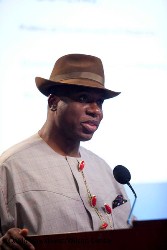 Oil is doubtless the main Nigerian export, leaving the national economy dependent on its production and distribution. One of the cardinal priorities of the current class of elected officials is to reduce oil dependence and diversify the Nigerian economy by developing the agricultural sector and creating jobs in manufacturing and tourism. This diversification would lead to job security and a more competitive and stable Nigeria, thereby increasing regional and international confidence in the country. Past spats of violence and tumult have shaken investor confidence and left valid questions in the minds of many risk-averse practitioners. But, peace in the delta is beginning to take hold and can be seen through the recent rise in oil production. Each Nigerian state is endowed with different assets that should be carefully considered by potential investors and business partners. Rivers State has a population of five million and is the largest oil and natural gas producer in the country. Governor Amaechi characterized this abundance of natural resources as a blessing and a curse for the state. Oil production in Rivers has stimulated economic growth and employment opportunities for the state, but it has also given rise to environmental degradation and pollution in certain areas. Additionally, there has been a gulf between the wealth generated by this industry and the actual income of the population, which must be resolved. The potential for development within the power and agricultural industries could address this issue and alleviate some of the economic disparities among the local population. Rivers State has made progress in the education and health care sectors, yet there is always room for improvement. A recent partnership with an Indian firm has led to the modernization of the school system, bringing it up to UNICEF standards. Availability of and access to healthcare has also been a priority, and medical tourism is an option under consideration by local officials.
Oil is doubtless the main Nigerian export, leaving the national economy dependent on its production and distribution. One of the cardinal priorities of the current class of elected officials is to reduce oil dependence and diversify the Nigerian economy by developing the agricultural sector and creating jobs in manufacturing and tourism. This diversification would lead to job security and a more competitive and stable Nigeria, thereby increasing regional and international confidence in the country. Past spats of violence and tumult have shaken investor confidence and left valid questions in the minds of many risk-averse practitioners. But, peace in the delta is beginning to take hold and can be seen through the recent rise in oil production. Each Nigerian state is endowed with different assets that should be carefully considered by potential investors and business partners. Rivers State has a population of five million and is the largest oil and natural gas producer in the country. Governor Amaechi characterized this abundance of natural resources as a blessing and a curse for the state. Oil production in Rivers has stimulated economic growth and employment opportunities for the state, but it has also given rise to environmental degradation and pollution in certain areas. Additionally, there has been a gulf between the wealth generated by this industry and the actual income of the population, which must be resolved. The potential for development within the power and agricultural industries could address this issue and alleviate some of the economic disparities among the local population. Rivers State has made progress in the education and health care sectors, yet there is always room for improvement. A recent partnership with an Indian firm has led to the modernization of the school system, bringing it up to UNICEF standards. Availability of and access to healthcare has also been a priority, and medical tourism is an option under consideration by local officials.
H.E. Ibrahim Shehu Shema
The Governor of Katsina spoke about his state of six million people and described the possibilities that investors could explore within its borders. Katsina State is particularly rich in minerals including precious stones, including diamonds, yet the extraction and refinement industries within the state are underdeveloped. There are also vast opportunities for modernization and expansion within the agricultural sector. Farming is the principal source of livelihood in 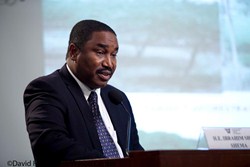 Katsina, and any advances made would have a direct, positive impact on the local population. Nationally, agriculture is one of the largest contributors to Nigeria’s GDP and, is, therefore, an area that, if properly developed, could provide sustainable and productive occupations for many Nigerians. Compared to other Nigerian states, Katsina lacks abundance in oil reserves, which has led to the diversification of the energy sector and investment in alternative power sources. Currently, a substantial wind power project is being realized to harness energy through more environmentally sound methods. This sector has ample room for growth. In conclusion, Governor Shema emphasized his commitment to providing commercial and industrial incentives to encourage business partnerships in his state. “We have the ambition to ensure that our people are productively employed,” he stated, “and that our resources are well-harnessed for the well-being of all in Nigeria.” “If we harness agricultural resources well, along with oil resources and minerals, I have no doubt that Nigeria’s quest for development by 2020 is achievable,” the Governor asserted.
Katsina, and any advances made would have a direct, positive impact on the local population. Nationally, agriculture is one of the largest contributors to Nigeria’s GDP and, is, therefore, an area that, if properly developed, could provide sustainable and productive occupations for many Nigerians. Compared to other Nigerian states, Katsina lacks abundance in oil reserves, which has led to the diversification of the energy sector and investment in alternative power sources. Currently, a substantial wind power project is being realized to harness energy through more environmentally sound methods. This sector has ample room for growth. In conclusion, Governor Shema emphasized his commitment to providing commercial and industrial incentives to encourage business partnerships in his state. “We have the ambition to ensure that our people are productively employed,” he stated, “and that our resources are well-harnessed for the well-being of all in Nigeria.” “If we harness agricultural resources well, along with oil resources and minerals, I have no doubt that Nigeria’s quest for development by 2020 is achievable,” the Governor asserted.
H.E. Liyel Imoke
Cross River State is one of the most dynamic states of Nigeria and is heralded as one of the “cleanest and greenest” in the country.  Moreover, Cross River’s economy is growing faster than the nation’s economy at 6.33% due to its plenitude of minerals and natural resources. It is also host to one of the largest tropical forest in Africa which offers an added level of biodiversity in the natural environment. Cross River State encompasses three different climate zones allowing for a range of agricultural variety that constitutes 42% of the state’s GDP. In addition to the agricultural offerings of the local environment, the prospect for tourism is optimal in the state that boasts of having “Africa’s warmest welcome.” As a result of significant foreign investment, this sector is slowly growing and shows promise for extensive job creation. In conjunction with the drive to boost tourism in the region, Governor Imoke highlighted the need for investment in education and professional training, notably in the service industry. Cross River is home to a sizable skilled and educated (over 1.8 million literate) workforce, and skill-specific training would increase their ability to shift towards a more service-driven economy.
Moreover, Cross River’s economy is growing faster than the nation’s economy at 6.33% due to its plenitude of minerals and natural resources. It is also host to one of the largest tropical forest in Africa which offers an added level of biodiversity in the natural environment. Cross River State encompasses three different climate zones allowing for a range of agricultural variety that constitutes 42% of the state’s GDP. In addition to the agricultural offerings of the local environment, the prospect for tourism is optimal in the state that boasts of having “Africa’s warmest welcome.” As a result of significant foreign investment, this sector is slowly growing and shows promise for extensive job creation. In conjunction with the drive to boost tourism in the region, Governor Imoke highlighted the need for investment in education and professional training, notably in the service industry. Cross River is home to a sizable skilled and educated (over 1.8 million literate) workforce, and skill-specific training would increase their ability to shift towards a more service-driven economy.
Panel 2
Wale Adeosun, Founder and Chief Investment Officer of Kuramo Capital Management, moderated the second panel of Governors and stated that “as an investor, this event is a testament to what is happening in the country. To invest in the country, the key issue that everybody worries about is political stability and political risk. As you have seen from the [governors]… the political transition in Nigeria is a strong testament to what the future holds for the country.”
H.E. Gabriel Suswam
The crop-rich state of Benue is often called the “breadbasket” of Nigeria. Eighty percent of the 4.7 million people who inhabit  the state earn their livelihood from the land, rendering agriculture development the core focus of elected officials within the state. Farming education and training are provided to the local population by the Federal University of Agriculture, Makurdi and the Akperan Orshi College of Agriculture. Also, Benue has a wealth of coal, limestone, and salt deposits, and has a large beach corridor that is virtually undeveloped. Benue State is also extremely culturally vibrant, and in tandem with its picturesque beach properties have led the region’s leaders to prioritize tourism in development planning as an expanding industry that holds promise for the people and economy.
the state earn their livelihood from the land, rendering agriculture development the core focus of elected officials within the state. Farming education and training are provided to the local population by the Federal University of Agriculture, Makurdi and the Akperan Orshi College of Agriculture. Also, Benue has a wealth of coal, limestone, and salt deposits, and has a large beach corridor that is virtually undeveloped. Benue State is also extremely culturally vibrant, and in tandem with its picturesque beach properties have led the region’s leaders to prioritize tourism in development planning as an expanding industry that holds promise for the people and economy.
H.E. Owelle Rochas Anayo Okorocha
Imo State shares many of the characteristics of other Nigerian states i.e., agricultural wealth, gas resources, and abundant, inexpensive labor,  yet Governor Okorocha took pains to discuss the features that set Imo State apart from the others. First and foremost, education is the key focus of this region, and elected officials consider investments in this sector to be vital. The manpower and framework are already in place, but they lack the financing necessary to build the desired educational system. Within this system, officials hope to establish a network of professional schools and special training programs to equip a new generation of Nigerians with a skill set that can build and sustain competitive, market-oriented industries. To achieve this goal, potential investors will be incentivized by free land, 15-year tax exemptions, and work visas. Moreover, with specialized training and skills, the manufacturing industry in Imo will be able to grow beyond its current state.
yet Governor Okorocha took pains to discuss the features that set Imo State apart from the others. First and foremost, education is the key focus of this region, and elected officials consider investments in this sector to be vital. The manpower and framework are already in place, but they lack the financing necessary to build the desired educational system. Within this system, officials hope to establish a network of professional schools and special training programs to equip a new generation of Nigerians with a skill set that can build and sustain competitive, market-oriented industries. To achieve this goal, potential investors will be incentivized by free land, 15-year tax exemptions, and work visas. Moreover, with specialized training and skills, the manufacturing industry in Imo will be able to grow beyond its current state.
H.E. Ibikunle Amosun
The bustling region of Ogun is often referred to as the “gateway state” due to the large, busy  highway that adjoins disparate parts of the state. Agriculture, commerce, and industry are the strengths of Ogun, and local products are distributed with ease throughout the country via the transnational highway. Governor Amosun highlighted the particular fertility of the land in Ogun state with proclamation that “everything grows here!” He articulated the integrality of agriculture to the Nigerian economy and spoke of his desire to have a more open trading environment to facilitate the distribution of Nigerian goods. Furthermore, his ambitious goal of five hundred new investors over the next few years was emphasized by promises of land donations, legal permits, and tax incentives. Ogun’s strategic location, infrastructure, and natural resources combined engender a vast economic potential and demonstrate the positive changes that are taking place in Nigeria.
highway that adjoins disparate parts of the state. Agriculture, commerce, and industry are the strengths of Ogun, and local products are distributed with ease throughout the country via the transnational highway. Governor Amosun highlighted the particular fertility of the land in Ogun state with proclamation that “everything grows here!” He articulated the integrality of agriculture to the Nigerian economy and spoke of his desire to have a more open trading environment to facilitate the distribution of Nigerian goods. Furthermore, his ambitious goal of five hundred new investors over the next few years was emphasized by promises of land donations, legal permits, and tax incentives. Ogun’s strategic location, infrastructure, and natural resources combined engender a vast economic potential and demonstrate the positive changes that are taking place in Nigeria.
Concluding Comments
The government of Nigeria is making a concerted and deliberate effort to diversify the economy in order to provide Nigerians with legitimate, sustainable career paths. Past media attention has focused on the corruption, violence, and illicit practices of the informal economy that has plagued the country, but the government now hopes that new developments will allow the media to show a new emerging face of Nigeria. By providing Nigerians with education, healthcare, and professional opportunities, the prominence of the shadow economy will shrink dramatically. Further, decisive steps to rid the government of corruption have been taken and, in effect, transformed the public sector into a more transparent, proactive entity, and raised the prevalence of elected officials that are accountable to the people of Nigeria. This is providing a new democratic environment that hopefully fosters solid and fruitful business relations. Although the advent of an entirely stable political and economic environment is far from complete, consequential progress has been made, and a welcoming and advantageous business climate for foreign investors is on the rise.
Hosted By

Africa Program
The Africa Program works to address the most critical issues facing Africa and US-Africa relations, build mutually beneficial US-Africa relations, and enhance knowledge and understanding about Africa in the United States. The Program achieves its mission through in-depth research and analyses, public discussion, working groups, and briefings that bring together policymakers, practitioners, and subject matter experts to analyze and offer practical options for tackling key challenges in Africa and in US-Africa relations. Read more
Thank you for your interest in this event. Please send any feedback or questions to our Events staff.
